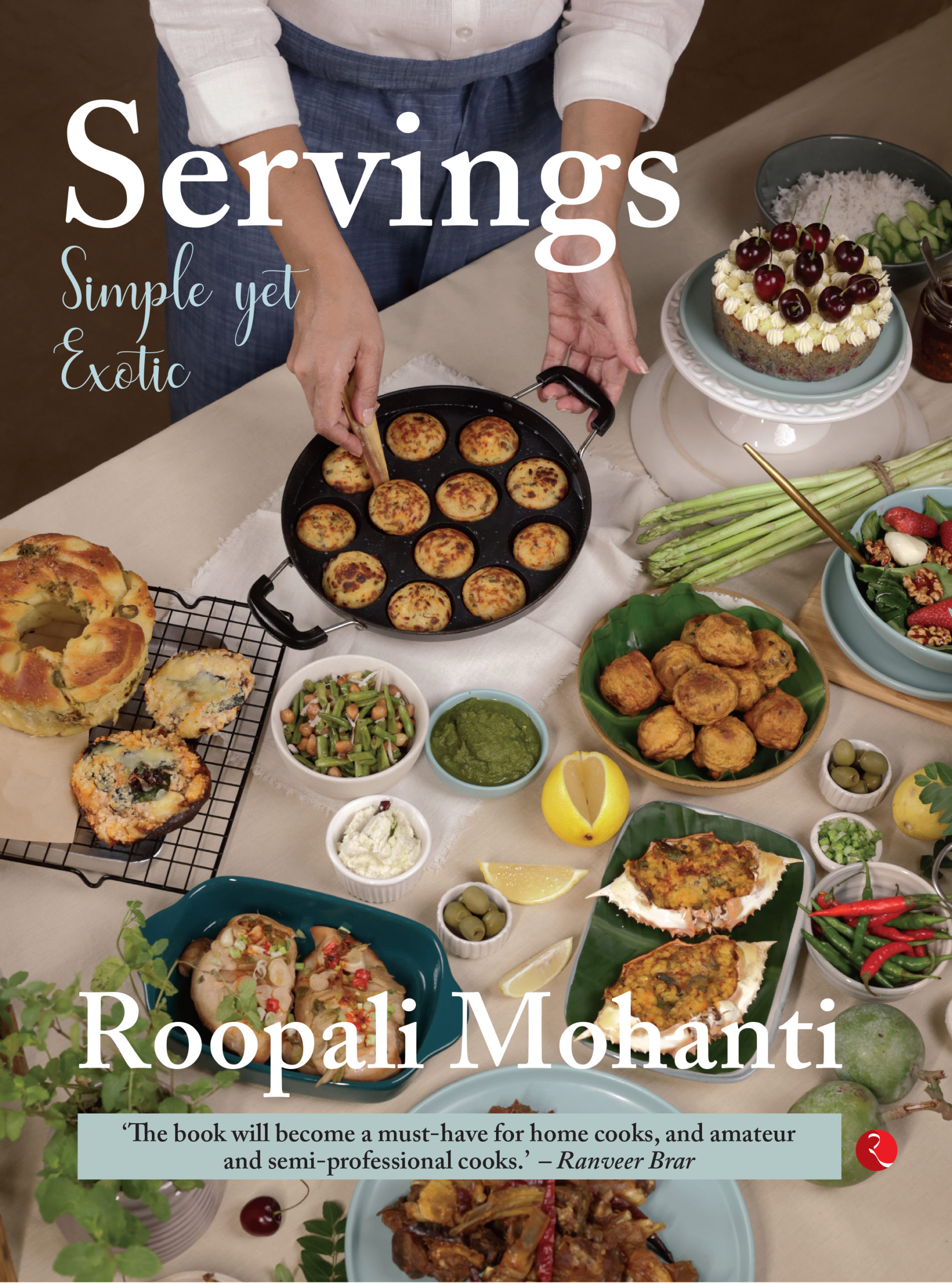
Inside Roopali Mohanti’s Kitchen
A Journey Through India with a Fearless Home Cook
[dropcap]H[/dropcap]ave you heard of Hinduja Aunty’s Sindhi Khadi? Tulu Khudi’s Arbi Tuk? How about Khulia Bhai’s Junglee Mutton and Coconut Rotis? These exotic sounding dishes take you to rarely visited territories of Indian cuisine to try food which is a culinary adventure.
If you thought Indian food is just the generic samosas, sag paneer and chicken tikka masala, then you have to meet Roopali Mohanti and take a stroll through her chunky new cookbook ‘Servings: Simple Yet Exotic” and taste some of the delights of a truly eclectic Indian kitchen. This beautiful book takes you to so many different parts of India.
Roopali is a home cook who had the adventure of growing up in the home of an Indian navy man and her childhood was spent in cities from Kochi to Coimbatore to Mumbai to name just a few. Being a Navy brat, she gathered many foodie experiences.
She loved hearing from her father about formal mess night menus which were a common occurrence in the defense services. Her mother not only cooked their native Odiya food at home but all that she had picked from the family’s postings in various cities around India and their travels abroad.
A glance through the pages tells you that Roopali understands how people eat today – brunches, starters and chaitime are all taken care of along with the main meals. It takes a village to write a cookbook as there are so many everyday people who share their recipes in this eclectic cookbook.
These are people you have not met but who wouldn’t want to try Mangala Aunty’s Onion Sambhar or Bhai’s Asian Red Chili Prawns? And you would definitely be curious about Abi Nana’s Ou Khatta (Elephant Apple Chutney). Roopali’s friends and neighbors are an intriguing bunch. Here are some of the adventures they take you on.
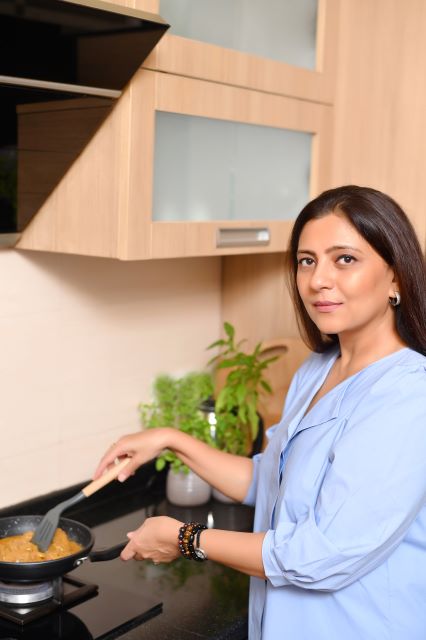
[dropcap]F[/dropcap]rom Delhi she offers Moradabadi Dahi ki Phulki, Purani Dilli Yakhni Pullao and Pistachio Cake with Rose; From Kolkata comes Dumplings and Rahu Fish in a light ginger-cumin gravy and Shailashree’s Phulkobir Malai Curry (Cauliflower Coconut Milk Curry) and from Odisha, Rinku’s Dahi Baras and Nadiya Rasa Bhaja Chenna Tarkari (Fresh Cottage Cheese Cubes in Coconut Gravy). There are recipes from many parts of India including Hyderabad, Konkan, Darjeeling, and Malabar. The recipes match the palate yearnings of modern Indians – there are Thai, Japanese, Chinese and Korean recipes too, not to mention Italian, English and even boarding school cuisine. There are also some special secrets – Roopali’s garam masala recipe and her recipe for homemade Chinese Chili Paste – always good to have these on hand!
The recipes are short and simple, uncomplicated for our complicated times. They are accompanied by excellent photography by the author and illustrations by Nandini Varma which enhance the story.
“My earliest food memories revolve around my mother in the kitchen, cooking delectable curries, baking cakes and setting soufflés,, always learning from cooks, help and friends,” recalls Roopali. “A certain interest for food also arose from the Enid Blyton novels I read as a child, especially the Malory Towers or St Clare’s kind of boarding school series, tuck boxes with cakes, tarts and buns or feasts with cold chicken and salads – a section in ‘Servings’ Timeless Traditions has recipes related to boarding school meals. I am so glad that my father made it a point of introducing me to books and libraries when I was 5 or 6 years old.”
At the same time, living in a defense community made it possible to have exposure to the food lifestyles of so many diverse communities of India. She says, “My family is largely from Odisha but when one lives in defense communities your family is the people living around you. Everyone looks out for the other and there is a constant interaction in each other’s homes. As I grew older, friends’ families became like mine so picking up the phone and asking them for recipes only helped me grow and learn.”
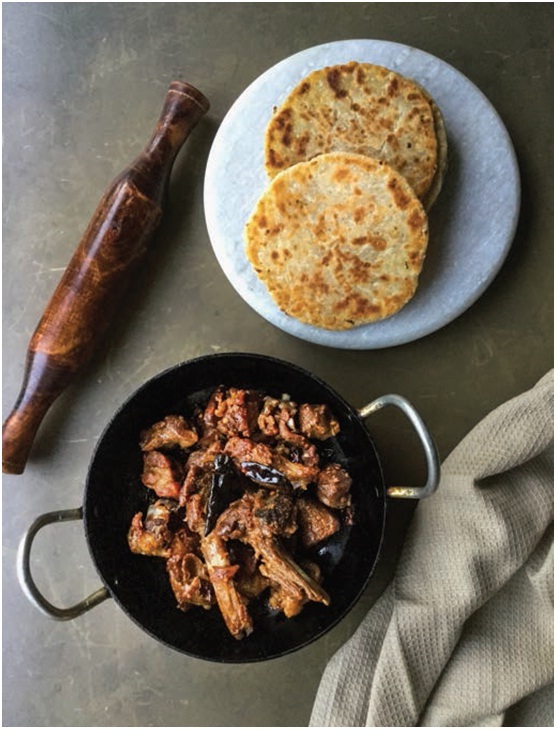
[dropcap]G[/dropcap]iven her love for cuisine of every kind, Roopali attended hotel management school in Kolkata. She recalls: “I owe a lot to my hotel management years. College was where I learnt a lot about the nuances of food production skills, be it as basic as how to use the knife correctly or how to get a sabayon right. The biggest takeaway however would be planning, be it in workflows or inventory management and an eye for detail. I do not regret not having a full-time food career; I have a lot of respect for chefs, it is one of the hardest jobs in the hotel industry and takes a lot of perseverance. I am content in my role as a home cook and ‘Servings’ is an ode to that journey.”
Her eclectic cooking is much appreciated on the home front. Her son is an Asian food buff and her Orange Chicken, and the Deconstructed Gimbal Bowl are his favorites. Her husband enjoys her take on Odiya food including her version of the traditional Kawdhai Pitha, a rice cake made in a wok. Has she ever thought of starting her own cooking show or doing videos on social media? She says, “Currently I haven’t given that a thought at all, but one can never tell. I do have a few recipes on my Instagram handle @servingsbyroopali, but I’m a late bloomer on social media, so I also am still learning and experimenting!”
She believes travel is an essential part of any gastronomical journey. She muses: “What is a place without its food culture? I consider myself lucky with regards to the myriad of food experiences. Very often I try and take a cooking class at the places we visit or food markets and that often translates to what I want to cook once I am back home. I also try out many new restaurants.”
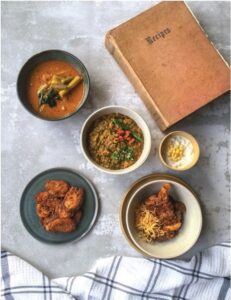
[dropcap]W[/dropcap]omen working outside the home and with not much help feel overwhelmed with complex recipes – what suggestions does she have for them from her own experiences? “I’ve always felt that the essential element to enjoying one’s kitchen time and not making it into a tasteless chore is planning,” she says and gives the following tips: “Set aside some time to create menus that everyone will enjoy, buy all the essentials accordingly, this eliminates wastage of ingredients and your time. If trying a new recipe line up all the ingredients so that there are no last-minute hiccups. Once all of this is in place there is a smoother workflow.”
What’s a typical food workday for Roopali – does it involve going to farmers markets, researching or actually cooking? She says, “A typical food day for me will be planning a menu, researching the recipe and then actually cooking. More often than not, it will be followed by taking a picture of the food, now that I enjoy the process of food photography.”
So, from these myriad roles, what finally gives her the most joy in her day?
“Maximum joy for me is when I know everyone at the table has thoroughly enjoyed their meal and also when a new food experiment comes out satisfactorily.”
Recipes To Try At Home from Roopali Mohanti
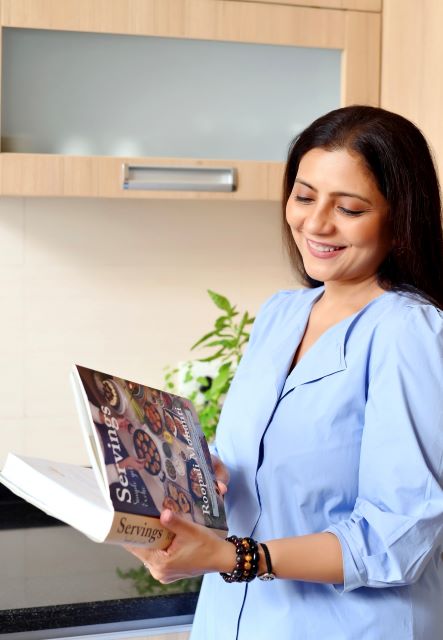
The book is available in bookstores across India as well as on amazon.com
Hinduja Aunty’s Sindhi Kadhi, Tullu Khudi’s Arbi Tuk and Salli Boti
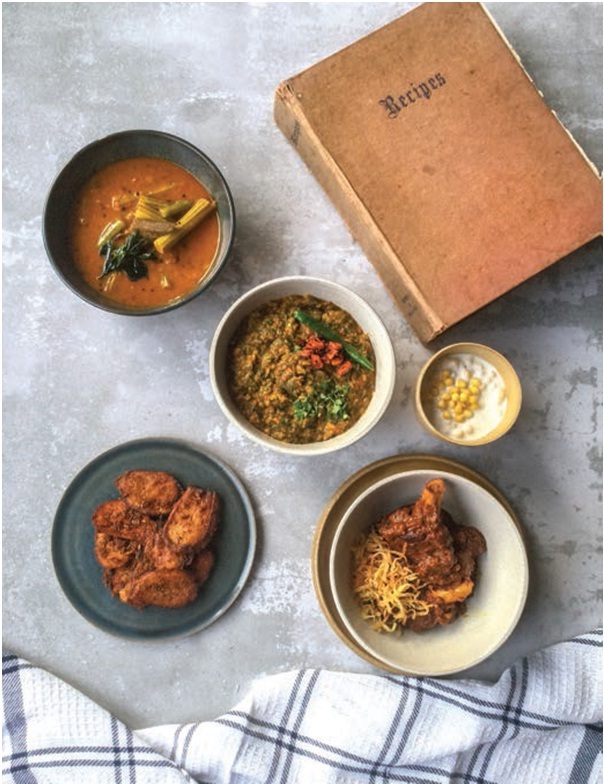
Hinduja Aunty’s Sindhi Kadhi
(Serves 4)
- Refined oil: 1½ tbsp • Fenugreek seeds: ¼ tsp
- Asafoetida powder: ½ tsp • Cumin seeds: ½ tsp
- Kashmiri chilli powder: ¼ tsp • Mustard seeds: ¼ tsp
- Red chilli powder: ¼ tsp • Salt: 1 tsp
- Turmeric powder: ½ tsp • Gram flour:3–4 tsp
- Kokum: 2 pieces soaked or tamarind paste: 1½ tsp
- Ginger: ½ inch grated • Tomatoes:2–3 medium boiled and puréed
- Cluster beans: 8–10 trimmed and • Green chillies: 1–2 slit halved
- Drumsticks: 2 cut and boiled • Water:1½–2 cups
- Okra:6–8 trimmed and halved • Curry leaves:1 sprig
- Ghee: 1 tsp
- Heat oil in a wok/kadai. Stir fry okra with a little salt. Remove okra and keep side.
- Add fenugreek seeds, cumin seeds and mustard seeds to the wok/kadai. Let them crackle.
- Add gram flour and cook until light brown. Add turmeric powder, asafoetida powder and ginger.
- Add both chilli powders, stir and add ½ cup water to smoothen the mixture, ensuring it does not burn.
- Add puréed tomatoes and salt and cook for 3–4 minutes.
- Add green chillies. Add tamarind paste/kokum water and cook for 2–3 minutes.
- Add all vegetables including okra, cook a little and add more water. Add remaining salt and boil to the desired consistency.
- To temper heat ghee in a pan and add curry leaves. Let them crackle.
- Pour temper over kadhi and serve hot.
TULU KHUDI’S ARBI TUK
(Serves 4)
- Taro (arbi): ½ kg • Garlic paste 1½ tsp
- Asafoetida powder: ½ tsp • Chana masala: 1 tsp
- Red chilli powder: ½ tsp • Caraway seeds: 1 tsp
- Refined oil: 1 tsp + extra for deep • Salt: ½ tsp frying
- Peel taro. Boil in salt water till cooked but not mushy.
- Strain in a colander. Cut taro lengthwise into 2 pieces
- In a wok/kadai heat oil on a medium flame and deep fry taro.
- Remove from oil and cool, press each piece between your palms and flatten.
- Heat 1 tsp oil in a non-stick pan.
- Sauté garlic paste and add asafoetida powder, chana masala, red chilli powder and caraway seeds.
- Add taro, toss well until golden and well coated.
- Check seasoning. Serve hot.
SALLI BOTI
(Serves 4)
Salli
- Potatoes: 2–3 large grated into thin long
strands.
- Salt: 1 tsp
- Refined oil: to deep fry
- Soak the grated potatoes in salt water.
- Strain in a colander and dry on a paper towel for 15 minutes.
- Heat oil in a wok/kadai on a medium flame, deep fry grated potatoes until crisp.
- Add salt, mix well and store after cooling
Boti
- Mutton: 1 kg rib and pieces • Onions: 3 large chopped
- Tomatoes:4 medium blanched and • Green chillies: 3–4 chopped peeled
- Refined oil: 3 tbsp • Garlic paste: 1¼ tsp
- Ginger paste: 1¼ tsp • Turmeric powder: 1¼ tsp
- Red chilli powder: 3–4 tsp • Jaggery powder: 1 tbsp
- Vinegar:2 tbsp (Goan vinegar preferred)
- Salt: 2–2½ tsp • Water:150–200 ml
- Heat oil in a pan. Sauté onions until golden with ½ tsp salt.
- Add mutton, ginger and garlic paste, green chillies, turmeric powder and red chilli powder.
- Cook the meat for 10 –15 minutes until brown.
- Add tomatoes and cook further.
- Add 1 tsp salt and water, boil, then cover and cook for 45 minutes stirring occasionally until the mutton softens.
- Add jaggery powder, vinegar and cook for 5 minutes.
- Check seasoning. Serve hot, topped with salli
